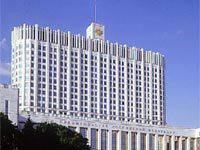What happens to the Russian government?
The Russian government has been recently spewing surprising ideas and conclusions. While the proposal to increase the fee for those divorcing to 30 thousand rubles can be attributed to the category of jokes, the ideas of job cuts or redistribution of pensions are quite serious. They may have a very negative impact not only on the economy but other areas as well.

Let's start with unemployment. Prime Minister Dmitry Medvedev outlined at the Investment Forum in Sochi that it has to be dealt with through the reduction of "inefficient jobs." A prerequisite for this is a relatively low level of unemployment in Russia that, according to Economy Minister Alexei Ulyukayev, in 2014 will reach only six percent of the working population.
Undeniably, this number is not very different from the U.S. unemployment rate of 7 percent, German 6 percent and Chinese 4.2 percent. However, the unemployment rate is determined by the government according to their own method that is different from the internationally recognized system for calculating the number of unemployed adopted by the International Labor Organization. This system accurately determines the overall level of unemployment, including hidden and partial unemployment.
According to this method, there are nearly 10 million unemployed in Russia, which considering 75-million strong labor force is equal to approximately 14 percent.
It is also unclear what method or standard is used to determine the level of efficiency in a workplace. For example, the indicators of efficiency of the government work are clear - the decline in GDP, rising unemployment and sudden budget deficit. The efficiency indicators of the work of an assembly worker at a defense plant are not that clear. After all, a rocket being assembled does not have a market value in the country, and pricing in the economy, thanks to the government, is virtually uncontrolled.
In addition, Russia, unlike most Western competitors, has an extremely acute demographic problem. In certain rural and remote areas there are no workers. Jobs deficit only in the defense sector is some three hundred thousand people. The labor shortage will only increase, because the generation of 1990s is entering the work place. This generation has suffered the most as a result of cannibalistic liberal reforms.
Considering these facts, how should the intentions to cut jobs and throw people in the street be viewed? It would be good to believe that the Prime Minister was referring to maneuvering manpower when redundant labor force is directed to newly created production facilities in the Far East, in the defense industry, or the agricultural sector. However, such programs could not be found in the list of government documents.
Another myth voiced by the Prime Minister is related to labor productivity. Allegedly, it is much higher in enterprises with private ownership compared to the state-owned companies. This, mildly put, incorrect postulate that served as the ideological basis for the destruction of the largest industrial companies, has long been refuted.
In the Soviet Union, where nearly 100 percent of enterprises were state-owned, labor productivity in the mid-1980s was 70 percent of the productivity in the USA, despite annual increases by 2-2.5 percent. In modern Russia where the private sector accounts for approximately 70 percent of the economy, labor productivity is 26 percent of that in the U.S. In early 2000 it was 13 percent and started to increase only after Russian President Vladimir Putin began implementing policies aimed at increasing the public sector.
It is understandable why the Prime Minister Dmitry Medvedev did not cite a single fact in support of his thesis about the benefits of private production. According to strategic criteria of the economy they simply do not exist.
In addition, it is absolutely incorrect to compare a private restaurant, for example, where by definition state ownership is not necessary, to the production of spacecraft or power turbines. These are different economic and organizational categories that do not overlap.
Among other "innovations" is a proposal to increase the retirement age for women to 60 years and allocate the funded part of pensions to the payment of the Pension Fund debt.
The implementation of each of these proposals would mean the actual collapse of the socialist state that the Russian Federation is under the Constitution. This would mean the final transition to the unique in the world history model of absolute social-Darwinian capitalism according to the monetarist model.
This sounds like a dream of those in favor of the socio- economic bloc of the government and the Higher School of Economics providing ideologically liberal project in the economy and politics.
Dmitry Medvedev, due to the nature of his work cannot personally check how absurd certain statements and postulates are. His speeches are prepared by the ideologists of liberalism led by Evgeny Yasin and, until recently, Sergei Guryev, now a Parisian, from the above mentioned structures who expose one of the leaders of the country in a false light.
Yuri Skidanov
Pravda.Ru
Subscribe to Pravda.Ru Telegram channel, Facebook, RSS!


